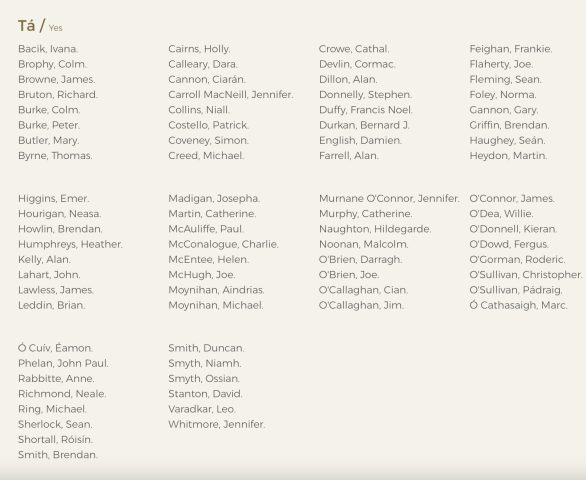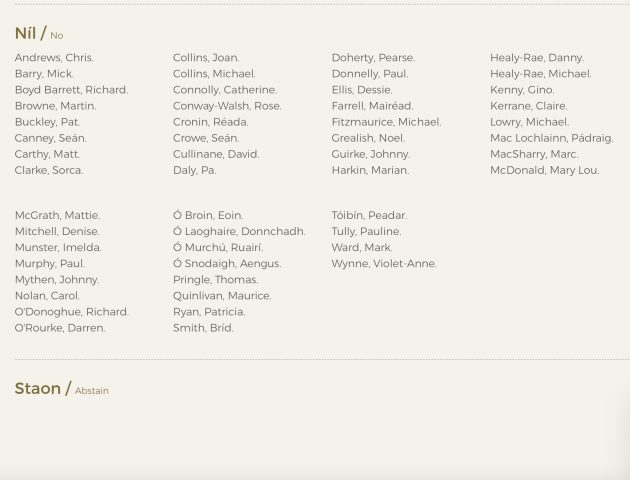The Dáil has passed the Criminal Justice (Incitement to Violence or Hatred and Hate Offences) Bill, with the contentious legislation passed by a majority of 78 to 52 votes.
It follows Justice Minister Helen McEntee’s confirmation, last month, that she was not proceeding with plans to introduce new hate speech laws, but would proceed with the hate crime element of the legislation.
A range of amendments made in the Seanad in September removed parts of the Bill that deal with incitement to violence and hatred, the hate speech elements, but leave in the provisions dealing with hate crime.
Ms McEntee said she wanted to “remove the incitement to violence or hatred provisions entirely from this Bill so that we can progress this important element of legislation and send a very clear message that hatred and violence are not tolerated in our society,” adding:
“I have said very publicly that I believe we need to update our 1989 Acts. I absolutely believe this needs to be next on our agenda.”
Speaking tonight, Ms McEntee said that she “absolutely believes” that the Dáil will in the future consider introducing hate speech laws.
“We’re here because I fundamentally believe that we need to have hate crime legislation on our statute, and we don’t. I’ve said it at the outset and it’s not that I’ve been forced or pushed into a particular route, but I believe that we had a consensus, very clearly in this house, and I believe that we lost that consensus,” she said.
“I believe that instead of not enacting any element of [the Bill], I wanted to ensure that hate crime, for the first time, was put on statute. We’re the first country across Europe to have it, and I absolutely believe that we need to have it,” Ms McEntee said, continuing:
“We’re here to make sure that we have for the first time, on our statute, hate crime legislation. But I do believe that we need to do more to update and to amend and to improve the ‘89 Act. The ‘89 Act will still exist. It is there; we will still have incitement legislation.
“Yes, I absolutely accept that there are different ways that this could have been done, but I fundamentally believe that we need to have hate crime legislation on the statute books, and that’s why we’re here this evening. That’s why I’m progressing this, and that’s why I hope at a later stage we’ll be able to address the elements of the incitement to hatred and violence elements that were taken out.”
The Minister said she “fundamentally believes” that the incitement to hatred and violence elements of the law had to be “kept together” and progressed “at a later stage.”
A number of opposition politicians expressed strong opposition to the revised Bill tonight, including the Rural Independent Group, who voted against the legislation.
Mattie McGrath said that the legislation should be “taken back,” as he questioned the “rush” around the law.
“Why the rush? Rushed legislation is often, nearly always, bad legislation,” he said, pointing to Helen McEntee’s “desire to have the legislation under your belt.”
The Tipperary TD called the law a “half-baked vanity project,” stating that the law was about “trying to intimidate ordinary citizens from having their voice heard.”
“You don’t like the voice of the people,” McGrath told the Justice Minister. “Your government has been the most anti-ordinary people that I’ve ever seen here in my term of four governments. I don’t know why you’ve such a dislike for them. The games you’re playing with them and the legislation you’re passing is not helping the people […] I and my colleagues in the Rural Independents are totally opposed.”
McGrath further described it as a “last ditch attempt” by the Justice Minister to “save face.”
Deputy Carol Nolan, meanwhile, said tonight: “The Rural Independent Group voted against flawed and dangerous legislation. In relation to this Bill, a number of experienced legal experts have correctly pointed out that the government don;t actually define what ‘hate speech’ is.”
“This legislation,” she said, “Is another slippery and regressive step by a government that has truly embraced work culture. It would serve them better to focus more on the economy and small businesses that need support.”
Peadar Tóibín of Aontú accused Sinn Féin of going “missing in action,” as he accused the party of “stealing my clothes.”
Taking aim at his former party for their U-turn on the Hate Crime Bill, Mr Tóibín said that his party had been the only ones to “fully oppose” the law.
Meanwhile, Sinn Féin’s Deputy Matt Carthy said that Helen McEntee’s government had chosen to proceed with “a Frankenstein of a Bill,” insisting that the party was totally opposed to the amended Hate Speech Bill.
“This is bad legislation which has been rushed through in the dying days of a bad government,” Carthy said.
Mr Carthy said that “a proper consensus” should have been reached in the House, including “an actual definition of hate.”
“The current definition of hate [in the Bill] is defined as hatred. It’s circular, and I don’t believe it’s an acceptable way of doing legislation. And it does, I have to say, remind me of Roderic O’Gorman’s suggestions of a durable relationships, which we know caused so much confusion in our society because nobody knew precisely what it meant.”
“Now we have Minister McEntee trying to introduce a new definition of gender, despite there being no consensus as to what that means,” Mr Carthy said, pointing out that the Bill defines gender as including transgender, and a “gender other than male or female.”
“Minister, most people do not understand what that means precisely,” he said.
Deputy Danny Healy-Rae also spoke out against the law prior to the vote, telling Minister McEntee that he has received “calls practically every week” about the Bill, and that “people just don’t trust you in relation to this Bill.”
“We’ve been a democratic State for the last 100 years. What was wrong with it? Why are we trying to change it? Why are we trying to shut people up?” Mr Healy-Rae asked. “Why are we trying to deny them the right to talk?”
The result of Wednesday night’s vote was as follows:

